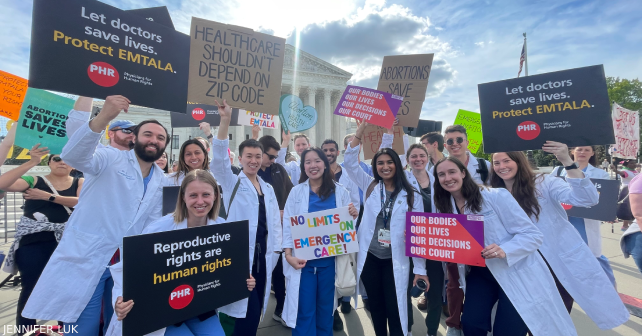
autonomy to make these critical and timely decisions to provide lifesaving care.
Explore This Issue
ACEP Now: Vol 43 – No 12 – December 2024Dr. Draper concludes by suggesting that physicians should advocate for clearer laws if they find them ambiguous. We applaud Dr. Draper’s optimism that physician input would inspire lawmakers to clarify the life-threatening impacts of their laws, but in fact the real world has shown us the opposite. Take Zurawski v. State of Texas,2 where women who were denied abortions despite medical necessity sought clarification on Texas’s “medical emergency” exception. They asked the State of Texas for clarification on the “medical emergency” exception, arguing that the laws contained conflicting language and nonmedical terminology, making it unclear when physicians are permitted to provide care. In their decision, the Texas Supreme Court failed to offer additional clarification on what care is permissible, despite physicians asking for it, which does not help improve care for women like Josseli Barnica.
The collateral damage of these restrictive laws continues to be the death and injury of pregnant patients and their babies. Dr. Draper and others argue that treating pregnancy emergencies shouldn’t be conflated with expanding access to elective abortion. We agree that this is not the forum to advocate for protecting or expanding abortion access in violation of state law. But to ignore the fact that our patients, and their families, are experiencing harm due to these bans seems to be both willfully ignorant and factually insincere. As physicians committed to saving lives, we hope to work together to protect pregnant people in our emergency departments, regardless of the post-Roe restrictions imposed by state governments.
———————————————-
 Dr. Chung is a PGY-4 resident in emergency medicine at George Washington University in Washington, D.C.
Dr. Chung is a PGY-4 resident in emergency medicine at George Washington University in Washington, D.C.
 Dr. Gupta is a PGY-2 resident in emergency medicine at George Washington University in Washington, D.C.
Dr. Gupta is a PGY-2 resident in emergency medicine at George Washington University in Washington, D.C.
 Dr. Jacobs is assistant clinical professor of emergency medicine at the George Washington University School of Medicine. She is an ACEP Ethics Committee member.
Dr. Jacobs is assistant clinical professor of emergency medicine at the George Washington University School of Medicine. She is an ACEP Ethics Committee member.
 Dr. Kass is an emergency physician in New York City and the clinical lead for Access Bridge.
Dr. Kass is an emergency physician in New York City and the clinical lead for Access Bridge.
 Dr. Chernoby is an assistant clinical professor of emergency medicine at George Washington University in Washington, D.C., and a reproductive rights lawyer.
Dr. Chernoby is an assistant clinical professor of emergency medicine at George Washington University in Washington, D.C., and a reproductive rights lawyer.
References
- Nambiar A, Patel S, Santiago-Munoz P, et al. Maternal morbidity and fetal outcomes among pregnant women at 22 weeks‘ gestation or less with complications in 2 Texas hospitals after legislation on abortion. Am J Obstet Gynecol. 2022;227(4):648-650.e1.
- State v. Zurawski, 690 S.W.3d 644 (Tex. 2024) Court: Supreme Court of Texas. Published May 31, 2024. Accessed November 12, 2024.
Pages: 1 2 3 4 5 | Single Page





3 Responses to “Point/Counterpoint: Abortion in the Emergency Department”
December 22, 2024
Todd B TaylorIn any contentious debate, it is important to hear from all sides, as the “truth” often lies in the middle. I wish to thank & congratulate Dr. Draper for her courage in bringing this perspective. In our current media-driven ideological “cancel-culture” society, contrarian voices are all too often left unheard.
In the rebuttal, Dr. Draper was called out by name 6 times in 7 paragraphs. While not particularly ad homonym, I will point out her arguments are reflective of the sentiments of many emergency physicians & the even the lay public who have had enough of political posturing.
In attempts to foster political ideology, the media & certain pro-abortion advocacy groups have foisted fantastical catastrophizing on the American public. There is no doubt this has caused many OB\GYN’s to take the most “conservative” (some might say “extreme”) approach in managing inevitable miscarriages.
While this rebuttal calls out a few examples (including in reference #1) of adverse outcomes, there is no doubt there are many more cases in which the usual standard of care in such states was followed, yet no physician has ever been accused, let alone prosecuted.
While this situation has certainly captured attention, there are other similar examples of controversies that have threatened the careers & livelihoods of physicians (albeit without the excessive media attention). In the early days of EMTALA, there were several examples of physicians trying to “do the right thing” that ran afoul of this federal statute, suffering career ending Medicare decertification & hundreds of thousands in fines. EMTALA also precipitated an on-call specialist availability crisis as thousands resigned or limited medical staff privileges. There were numerous hospitals that closed due to direct or indirect consequences of EMTALA. In time, however, advocacy, education, practice accommodation & case law resulted in something we can live with.
So, what I believe Dr. Draper is trying to say, let’s turn down the rhetoric & “right-fighting”, so we can move on to solutions that acknowledge reality & are ultimately best for patients.
December 23, 2024
John TannerFive versus one and you didn’t even give Dr. Draper a chance to respond? What’s up with that?
December 29, 2024
Mike DorrityHere’s a direct quote from the Texas Court opinion in State v. Zurawski the 5 authors cite but seem to ignore:
[2]Under the Human Life Protection Act, a woman with a life-threatening physical condition and her physician have the legal authority to proceed with an abortion to save the woman’s life or major bodily function, in the exercise of reasonable medical judgment and with the woman’s informed consent. As our Court recently held, the law does not require that a woman’s death be imminent or that she first suffer physical impairment. Rather, Texas law permits a physician to address the risk that a life-threatening condition poses before a woman suffers the consequences of that risk. A physician who tells a patient, “Your life is threatened by a complication that has arisen during your pregnancy, and you may die, or there is a serious risk you will suffer substantial physical impairment unless an abortion is performed,” and in the same breath states “but the law won’t allow me to provide an abortion in these circumstances” is simply wrong in that legal assessment.
As others have said on ACEP discussion boards, fear of prosecution is not the same as prosecution.